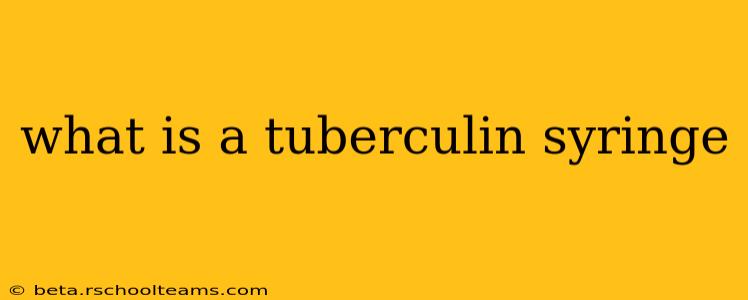A tuberculin syringe is a special type of syringe designed for administering very small volumes of liquid, typically between 0.5 ml and 1 ml. Its primary use is in administering tuberculin skin tests (TSTs), also known as Mantoux tests, which are used to screen for tuberculosis (TB) infection. However, its precision makes it useful for other applications requiring accurate measurement of tiny amounts of medication.
The distinctive feature of a tuberculin syringe is its fine calibrations. The barrel is marked in increments as small as 0.01 ml (or 0.1 cc), allowing for extremely precise measurements crucial for accurate dosage in sensitive procedures like TSTs. This high level of accuracy minimizes error and ensures the correct amount of tuberculin solution is injected.
Why is a Tuberculin Syringe Used for Tuberculin Skin Tests?
The Mantoux test, or PPD (purified protein derivative) test, requires a precise injection of a small amount of tuberculin solution intradermally (into the skin). Using a standard syringe can lead to inaccurate dosing, impacting the test's reliability. A tuberculin syringe's fine graduations ensure the correct amount of solution is administered, vital for obtaining accurate and interpretable results. The small needle diameter further minimizes discomfort and bruising during injection.
What are the Key Characteristics of a Tuberculin Syringe?
- Small Capacity: Typically ranging from 0.5ml to 1ml.
- Fine Graduations: Marked in increments of 0.01ml or 0.1cc for precise measurement.
- Short Needle: Often comes with a short, fine-gauge needle designed for intradermal injections.
- Clear Barrel: Allows for easy visualization of the liquid volume.
- Luer-Lok Tip (Usually): This type of tip ensures a secure connection with the needle, minimizing the risk of accidental detachment during injection.
What Other Uses Does a Tuberculin Syringe Have?
While primarily associated with TB testing, the precision of a tuberculin syringe makes it useful in other situations requiring highly accurate medication administration:
- Administering small doses of medications to infants or small children: Where precise dosing is critical to avoid overmedication.
- Injections for allergy testing: Similar to TB testing, accurate dosage is essential.
- Research applications: In scientific research where precise volumes are needed.
- Veterinary medicine: For small animals requiring accurate, low-volume injections.
How Does a Tuberculin Syringe Differ from a Standard Syringe?
The key difference lies in the volume and calibration. Standard syringes typically have larger capacities (e.g., 1ml, 3ml, 5ml, etc.) and coarser graduations. They are not designed for the precise measurement required for procedures like tuberculin skin testing.
What Size Needle is Used with a Tuberculin Syringe?
Tuberculin syringes usually come with a 25-27 gauge needle, which is fine enough for intradermal injections. The needle length is typically short to avoid deep penetration. However, the specific gauge and length may vary depending on the manufacturer and intended use.
Can I Use a Tuberculin Syringe for Other Injections?
While you can technically use a tuberculin syringe for other injections, it's generally not recommended unless you're dealing with extremely small volumes. For larger doses, a standard syringe is much more practical.
This information is for general knowledge and should not be considered medical advice. Always consult a healthcare professional for any health concerns or before administering any medication.
